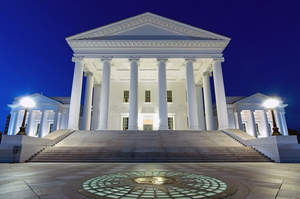|
Pop in for Pop-Up Sunshine Day
In honor of Sunshine Week, VCOG is hosting a Pop-Up Sunshine Day — a fast-paced, day of transparency news and even some good old movie fun — on March 16 at the Capitol of Virginia.
 Our morning session will be full of quick updates on all sorts of access issues, like budget transparency, a General Assembly update on FOIA, cameras in public meetings, electronic meetings and more. At around noon (we’re keeping the schedule loose!), we’ll dim the lights, offer some eats and then sit back to watch last year’s Best Picture Oscar winner (without mistaken envelope), “Spotlight,” a tribute to investigative reporting and deep dives into documents and records. Our morning session will be full of quick updates on all sorts of access issues, like budget transparency, a General Assembly update on FOIA, cameras in public meetings, electronic meetings and more. At around noon (we’re keeping the schedule loose!), we’ll dim the lights, offer some eats and then sit back to watch last year’s Best Picture Oscar winner (without mistaken envelope), “Spotlight,” a tribute to investigative reporting and deep dives into documents and records.
The event is FREE, but you must register for either or both the morning and movies sessions, and donations are always welcome.
Hope to see you there!
General Assembly notes
 From the director, Megan Rhyne: From the director, Megan Rhyne:
By most accounts, this year’s General Assembly session was a relatively quiet one, and that was certainly true with respct to bills affecting FOIA, access and transparency.
The bills that gave VCOG the most heartburn were all defeated, withdrawn or amended to take out the really scary parts. That included the bills to shield the names and concentrations of chemicals used in fracking (defeated), to make it a Class 1 misdemeanor for police to release the name of an officer involved in a shooting or excessive force investigation before six months had elapsed (withdrawn), and to flip the presumption of access to juror names and addresses (amended).
That doesn’t mean that all bills affecting FOIA were scuttled: a new exemption was added for solar services trade secrets (SB1226) and existing exemptions were expanded to include charitable gaming supplies (HB2178) and multidisciplinary child abuse teams talking about child abuse or neglect cases (HB1971). There was also an amendment to the Uniform State Building Code to exempt engineering and construction drawings of single family dwellings from disclosure (HB1587).
The FOIA Council study bills both sailed through, as did a bill to clarify that terms on the council extend past their appointment period if no replacement has been named, and one to add two new legislative members to the council.
The anti-SLAPP (strategic lawsuit against public participation) statute got a boost. It will now include statements made about matters of public concern made outside the public meeting context. A provision to extend the protections to product and services reviews was scrapped.
No chance, no hearing
Del. Dave Albo had better things to do with his time as chair of the House Courts of Justice Committee. As crossover loomed, Albo sent out a letter saying a constitutional law subcommittee would not be convened because the controversial bills that would be assigned to it had no chance of becoming law. The letter was referring to Republican and Democratic bills alike, mostly on abortion: the Democrats’ bills would be killed by the House majority party, while Republican’s bills would be vetoed by the governor, the letter said. Instead, he continued, time would be better spent on issues that “actually have a chance to become law,” like texting and driving, regulation of drones, DUI laws and stopping out-of-state violent sex-offenders from being near schools.
Bill requiring check registries dies
With potential impact figures ranging from $1 to $75,000, local governments and school districts successfully beat back a bill offered by Sen. Glen Sturtevant to require the posting of check registry-level data and credit card expenses. Though many localities already do this — from a simple posting of monthy Excel spreadsheets in Goochland County to grahic dashboards used in Williamsburg and other places — other areas balked, saying it would be too costly to implement and maintain. The local fiscal impact statement included an estimated cost of $75,000 for Fairfax County to cover “staff time necessary to extract, compile, and validate the data.” Roanoke said it would only cost $1,000, but also said it wasn’t possible to quantify “the increased public contact to answer questions as a result of the information being readily available.” On the other hand, Winchester, Danville and Wise County said they were already providng the information.
|
Lawmakers lobby for recorded meetings, vote casting machines
 As the last votes were being cast in the General Assembly Building — literally, the last votes, since the building is slated for demolition later this year to make way for a brand new building in (estimated) 2021 — 85 of 140 lawmakers signed on to a letter sent to the clerks of the House and Senate asking that the new building be equipped to record committee and subcommittee meeings. As the last votes were being cast in the General Assembly Building — literally, the last votes, since the building is slated for demolition later this year to make way for a brand new building in (estimated) 2021 — 85 of 140 lawmakers signed on to a letter sent to the clerks of the House and Senate asking that the new building be equipped to record committee and subcommittee meeings.
What’s more, the letter asks that such capabilities be implemented in the Pocahontas Building, the space formerly occupied by the Office of the Attorney General and the temporary home of the legilsature while the new building is being constructed.
And more still, the letter asks that that “transparent vote recording machines” be installed, too.
Read the letter here here and see if your delegate or senator signed.
|
Open government in the news
A federal judge in Alexandria granted the request of a Fairfax County police officer who was involved in a fatal shooting that prohibits the county’s police department from releasing the officer’s name. As was evident during debate on HB2043 regarding release of police names, the case highlights the tension between police departments that are trying to be more transparent and the individual officers who fear they will be targets for retribution.
A FOIA request by the proprietor of a cafe at the Newport News/Williamsburg International Airport about the termination of his long-term lease prompted the Daily Press newspaper to begin requesting records on its own. Tom McDermott lost his case over the termination, the trial of which raised questions about whether a member of the Peninsula Airport Commission could testify about what was discussed with the commission’s attorney during closed session, and the Daily Press was told that there were no written records about the commission’s use of state money to pay off the loan a struggling airline took out in order to fly routes out of Newport News. Nonetheless, the state, which had already cut off funds to the commission, said in late February that it would broaden its investigation into the commission’s use of the money.
Arlington County shook things up when it changed its procedure related to the “consent” portion of its monthly meetings. The board voted unanimously to take away the power of the public to remove certain items from the consent agenda. Board members said the change was needed to stop a small group of people from monopolizing staff time, especially on non-controversial matters.
The town of Claremont estimated that it cost more than $46,000 for it to fight a FOIA case brought by a former member of the town council.
At the same meeting where Petersburg City Council members received copies of “Robert’s Rules of Order” and an organizational chart of the city, the council agreed to suspend its own rules to allow a vote on whether to use tax dollars to pay for an outside attorney to represent Mayor Samuel Parham and Councilman W. Howard Myers from petitions for removal. On the other hand, the city launched a new budget transparency system that includes the ability to look at budget items graphically or to create customized reports. The Petersburg citizens who brought the recall petitions against Myers and Parham eventually withdrew their effort upon discovering that the petitions seeking citizen signatures did not include an explanatory cover letter, so some signers may not have been aware of the reasons the petitions were sought. Meanwhile, former Petersburg City Attorney Brian K. Telfair was charged with lying to police about a supposed threat that forced the city council to cancel a meeting last year. At the time, the city released a note saying the meeting had to be canceled because of safety concerns, which Telfair said the next day had to do with racial slurs and threats of physical violence against some council members.
Arlington and Loudoun Counties dug into the historical public records archives during Black History Month to tell the story of their respective locality’s struggle over segregation. Arlington debuted a digitized online collection of the effort to desegregate county schools, while Loudoun opened up old land records and meeting minutes to show the a century’s worth of segregation in the county.
A group of students at George Mason University sued the school and one of its affiliated foundations seeking records related to donations to the school by the Charles Koch Foundation, which is supported by businessmen and political activist brothers Charles and David Koch.
After years of operating with unwritten rules, the Norfolk City Council directed the city manager to actually put the rules down in writing. The council also reversed its policy of turning off the cameras that broadcast the meetings before the public comment period begins. As of Feb. 28, the cameras will stay on until the ned of the meeting. On the other hand, despite saying that the search for a new city manager would be transparent, the council has had a series of closed-door meetings on the subject, including which search firm the city would hire to find candidates for the job.
A state audit of the Virginia Department of Taxation recently showed that the agency’s technology partner, Northrop Grumman, had not updated dozens of critical security patches to protect the department’s systems.
A Shenandoah County supervisor was set to challenge the unexpected vote to oust him as chairman of the board. The vote came as the local school board adjourned its portion of a joint meeting with the board of supervisors. Though the county attorney said he thought the vote was improper, another supervisor on the winning side of the vote said she disagreed and that a parliamentarian at James Madison University said the board could act in the way that it did.
Despite being convicted on several public corruption charges stemming from his time as a Norfolk City Council member, the city treasurer, Anthony Burfoot, remained on the job as his case was being appealed. But in mid-February, on a petition from a local attorney, circuit judge Everett Martin ordered Burfoot to be suspended from office due to his “crimes of dishonesty.”
The Virginia Beach City Council indicated its desire to cut down on how long the public can speak at council meetings. Rules that have been in place since 2003 have given individuals three minutes each, unless they represent groups on planning items, in which case they get 10 minutes. Current practice was to allow group representatives on other topics to take up to 10 minutes.
The University of Virginia said discussions about its search for a new president to replace Teresa Sullivan that would be kept private. “We want to interview the best people in the country, said Frank M. Conner III, co-chair of the search committee, “And the best people won’t talk to us if they think there’s a breach in confidentiality.”
The New York Times reported that a collective of tobacco farmers, including some from the Bristol area, are suing the Bureau of Alcohol, Tobacco, Firearms and Explosives over a cigarette smuggling scheme that the farmers said swindled them out of $24 million and operated without any oversight.
Stay up to date on access
Sign up for VCOG’s daily listserv on access and First Amendment news from Virginia and accross the country. It’s free! |
